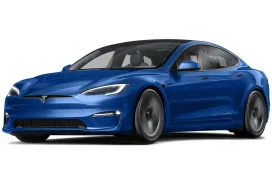When we asked Tesla Motors for a statement on the lawsuit filed by the "King of Lemon Laws" the other day, the company told us that it does not comment on pending litigation. Fair enough. That's a standard response. But the company has since felt the need to comment on the issue using its own company blog.
In a post called "When Life Gives You Lemons...," the Tesla Motors Team called lawyer Vince Megna (indirectly) an "opportunistic lawyer" and basically called him a liar. To wit: "... there are factual inaccuracies in the lawyer's story." Tesla says that the three claimed incidents when the Model S owner in question asked the automaker to buy the car back did not happen (Tesla acknowledges it happening once). And then the company basically says the owner was breaking his car on purpose:
We've got the entire response below, along with Megna's response to Tesla's statement. The key line: "There are companies, great companies run by Billionaires, that force consumers to give up their Freedom of Speech and Right to Trial by Jury just for the opportunity to buy an electric car." You can watch Megna's original video introducing the world to this case here.... the car's fuse blew on three occasions. Each time, our engineers explored all possible explanations and were never able to find anything wrong with the car. Still, just to be sure, we replaced several parts that could have been related to the alleged problem – all at no expense to the customer. When the fuse kept blowing despite the new parts, and faced with no diagnosis showing anything wrong with the car, the engineers were moved to consider the possibility that the fuse had been tampered with. After investigating, they determined that the car's front trunk had been opened immediately before the fuse failure on each of the three occasions. (The fuse is accessed through the front trunk.) Ultimately, Tesla service applied non-tamper tape to the fuse switch. From that point on, the fuse performed flawlessly.
By The Tesla Motors Team
April 9, 2014
We were taken by surprise by a lemon law claim recently filed against Tesla by a Wisconsin lawyer, describing himself as the "Lemon Law King", who says that we ignored his client's three demands for a buy-back after alleged problems with a Model S.
First, let us state that we believe in lemon laws – they exist to protect customers against cars that repeatedly suffer defects. That's a worthy thing to address. We also make a point of going above and beyond in customer service, which extends to buying back cars on fair terms from any customer who ultimately remains unsatisfied with their vehicle. We never want someone to be unhappy in their ownership of a Model S.
In this case, however, there are good reasons to be skeptical of the lawyer's motivations. The service record shows that the Tesla service team did everything reasonably possible to help his client and they were continuing their efforts to service his vehicle right up until the point the suit was filed with no warning. Indeed, our service team, which has been in contact with the customer numerous times since November, is still trying to resolve his stated concerns, many of which have elusive origins.
This lawyer's claim strikes us as unusual on several counts. For a start, it contradicts the general customer experience as measured by outside surveys. The annual Consumer Reports survey, for instance, gave Model S top marks for owner satisfaction, with a score of 99/100, the highest rating of any car ever. That doesn't mean a single customer can't have a bad overall experience, but it makes it highly unlikely. The claim also doesn't jibe with the other accolades afforded to the car, including Consumer Reports' "Best Overall" designation for its Top Picks 2014 awards, and the 2013 Motor Trend Car of the Year award.
More tellingly, however, there are factual inaccuracies in the lawyer's story. The customer did not make three demands for a buy-back. The only time any such claim was made was in a legal form letter sent to Tesla in November 2013 as a prerequisite for pursuing the claim in Wisconsin. Our service team was in close contact with the customer both before and after we received the letter, and the possibility of a buy-back was never mentioned during those discussions.
To give you a sense of our service relationship with this customer, it's worth considering our efforts to resolve two of his main complaints. One related to malfunctioning door handles. Even though our service team wasn't able to replicate the issue with the door handles as described, we replaced all the handles anyway. Despite the fix, the customer said the problem persisted. We were never able to reproduce the alleged malfunction but offered to inspect the car again and are still trying to do so.
Another issue was that the car's fuse blew on three occasions. Each time, our engineers explored all possible explanations and were never able to find anything wrong with the car. Still, just to be sure, we replaced several parts that could have been related to the alleged problem – all at no expense to the customer. When the fuse kept blowing despite the new parts, and faced with no diagnosis showing anything wrong with the car, the engineers were moved to consider the possibility that the fuse had been tampered with. After investigating, they determined that the car's front trunk had been opened immediately before the fuse failure on each of the three occasions. (The fuse is accessed through the front trunk.) Ultimately, Tesla service applied non-tamper tape to the fuse switch. From that point on, the fuse performed flawlessly.
It's also of interest to note that this particular lawyer filed a lemon law suit against Volvo in February last year – on behalf of the very same client.
We are continuing our efforts to work with the customer and are happy to address any legitimate concerns he has about his Model S. Customer service remains of utmost importance to Tesla, and no Model S owner should be unhappy with their car. However, we would also like the public to be aware of the potential for lemon laws to be exploited by opportunistic lawyers.
Rebuttal to Tesla's Blog Post
April 10, 2014
In Response to Tesla Blog:
In this case, Tesla ignored three lemon law demands from its customer. Tesla received the refund demands under Wisconsin's Lemon Law on 11-25-13, 12-13-13 and 12-19-13. All demands were sent by certified mail, delivered and verifiable on USPS.com. Tesla erroneously states in its blog, "the customer did not make three demands for a buyback."
Under the demands, Tesla was given 30 days to provide a refund. The vehicle was presented four times for the same nonconformity, and the vehicle was out of service for 66 days – 36 more than is allowed under the lemon law. Failure to provide a refund within the 30-day time period constitutes a violation of the Wisconsin lemon law. Tesla did not provide the refund or respond in any way – no call, no letter, no blog post.
Service personal/auto mechanics do not have involvement in the decision to buy back a car. That decision is made by the manufacturer – Tesla Motors, Inc. In not responding to my client's demand, Tesla's decision was clear. Tesla should not be "taken by surprise" with the suit, or claim it was "filed with no warning." The warning came last November.
Tesla may "believe in lemon laws," it just doesn't know how they work.
Tesla takes the big corporation approach by attacking its customer, rather than addressing its own failures. Diminish the person – make everything his fault. Blame your customer for problems that have "elusive origins." Or, allege foul play because a "fuse blew on three occasions," and "engineers were moved to consider the possibility that the fuse had been tampered with." Why not instead be moved to consider that Tesla has a problematic Model S that they just can't fix?
It's common on Tesla forums that door handles don't work...that customers can't get in their cars. That is precisely that problem that has persisted in this case. Door handles not presenting is nothing new to Tesla.
My client filed a lawsuit against Tesla. It remains obligated under the terms of the warranty to continue to repair defects with the Model S, not because of customer service, not because Tesla wants a happy customer, but because Tesla is required to by law.
I too find it "of interest" that more than one manufacturer rolls out a lemon now and then. Just today Toyota recalled 6 Million vehicles, and in the past few months, GM recalled 5.1 Million. Maybe tomorrow Tesla will buy back a lemon or two.
As a member of the "public" I appreciate your company taking the time to provide a Public Service Announcement that Lemon Laws can be "exploited by opportunistic lawyers."
I too, have a Public Service Announcement: There are companies, great companies run by Billionaires, that force consumers to give up their Freedom of Speech and Right to Trial by Jury just for the opportunity to buy an electric car.
Statement of Robert Montgomery
Regarding Tesla Blog Post 4-9-14
I am a medical doctor. I retired as a Colonel from the United States Army after 23 years of service. I served in Iraq, Kosovo, Nicaragua and South Korea providing medical care to soldiers and the local population. I was also a flight surgeon.
I am highly offended by Tesla's allegation that I tampered with the fuse, and that the problems with the car are my fault. I have never tampered with my Model S or any part of it. The Blog post disappoints me because it is a clear attempt to transfer responsibility for a defective vehicle from Tesla to me.












Sign in to post
Please sign in to leave a comment.
Continue